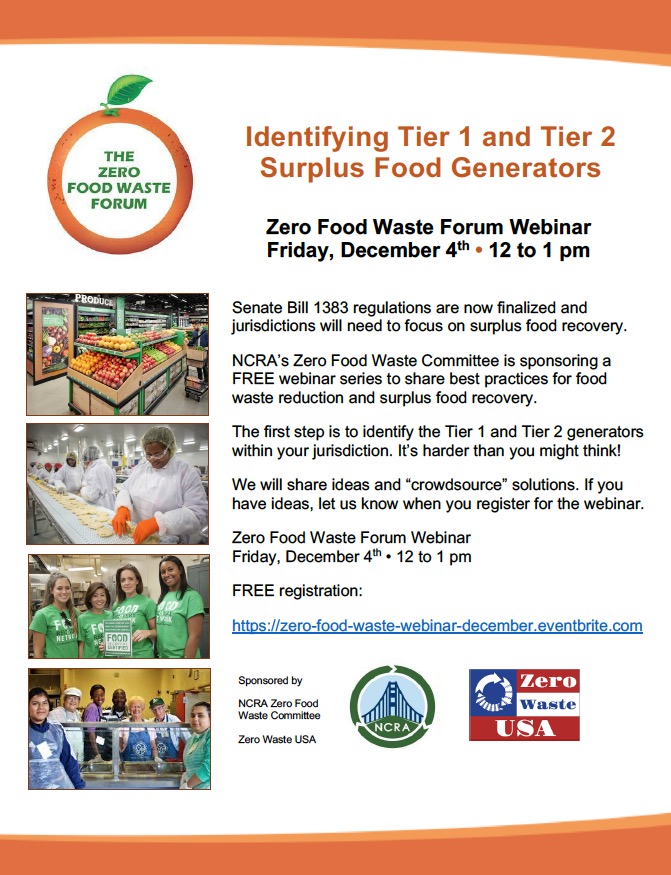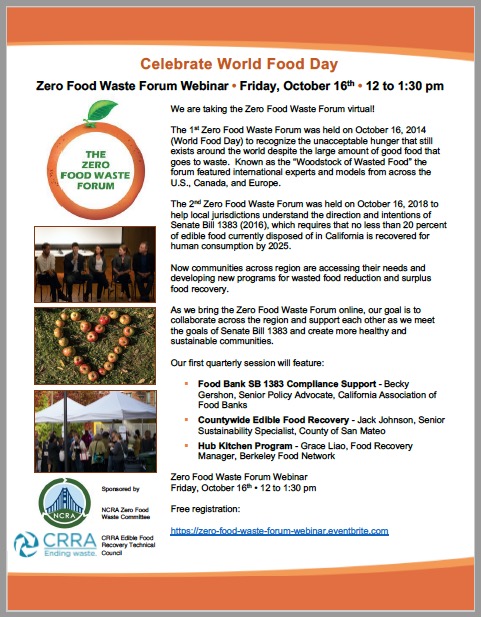Category: ZFWF Webinars
Celebrate World Food Day, 10/16/20
ZFWF: Federal Interest In Edible Food Waste Recovery, 10/18
Over 100 public sector, nonprofit and private sector professionals turned out for a program focused on successful statewide and regional policies and programs in food waste prevention and reduction and edible food re-purposing and recovery. The working forum provided opportunities throughout the day for attendees to break into smaller groups and delve more deeply into these subjects with presenters and colleagues.
NCRA hosted this second Zero Food Waste Forum on World Food Day – October 16, 2018, in Berkeley, in conjunction with the Solid Waste Association of North America (SWANA) Gold Rush Chapter and with support from the UC Berkeley Basic Needs Committee, Food, Equity, Entrepreneurship and Development (FEED), and the Ugly Fruit & Veg Campaign.
The purpose of the Forum was to provide an opportunity for local jurisdictions to better understand the direction and intentions of Senate Bill 1383 (2016), which requires that no less than 20 percent of edible food currently disposed of in California be recovered for human consumption by 2025.
Attendees enjoy food catered by FoodShift, a local non-profit that offers culinary job training, uses rescued food as a primary resource and sells and donates their products and coffee from 1951 Coffee, a non-profit specialty coffee organization providing job training and employment to refugees and asylmees. In the afternoon, Regrained offered attendees a snack of powerbars made from grains rescued from local breweries.
Setting the Stage
Martine Boswell of CalRecycle opened the day with an overview of SB1383’s requirements and notice of CalRecycle’s next round of Food Waste Prevention & Rescue Grants for which $5.7 million is allocated. NCRA will keep you posted regarding the grant cycle.
Justin Malan with Ecoconsult described the important work happening state-wide with environmental health inspectors, as AB1219 and related legislation now require them to inform food service businesses, about their right to donate food without fear of liability and about food donation options.
Melissa Romero of Californians Against Waste, gave an update on recent Food Waste Prevention, Recovery and Reuse Legislation and Regulations, including AB 954 (Chiu), the Uniform Food Date Labels bill which promotes the adoption of uniform date label phrasing to reduce consumer confusion, and SB 557 (Hernandez), which allows schools to donate food items that have been served and placed on share tables to food banks. Romero also reviewed the implementation deadlines of AB1826 which requires local jurisdictions across the state to implement an organic waste recycling program.
Innovative Programs
Barbara Hamilton, San Diego Food System Alliance, led off by describing a strategic county-wide food waste awareness partnership that leverages the national “Save The Food” public service campaign (a partnership with NRDC and the Ad Council) for community education, Re-Plate technology for food recovery, and LeanPath for food waste prevention. SDFSA is happy to share their material and strategies with other local jurisdictions.
Iesha Siler and Alyson Schill with the LA Food Policy Council, shared lessons learned from Los Angeles’ innovative public-private partnerships to promote food rescue. They described RecyLA’s new waste hauler contracts, requiring that haulers dedicate funding for the redistribution of edible food “before the bin,” in partnership with local non-profits. They also described some innovative approaches the City has taken to promote food waste prevention and organics recycling, including establishing composting hubs.
Robin Martin with Silicon Valley Food Rescue described the newly-launched pilot A La Carte program, which encompasses fleet of food trucks to rescue surplus food from institutions and deliver it directly to those in need, removing the intermediate steps of storage and redistribution. The pilot currently has one truck collecting food from Stanford University and delivering it to locations in Mountain View, Sunnyvale, East Palo Alto, and Palo Alto.
Annalisa Belliss with StopWaste presented an overview of the StopWaste Smart Kitchen Initiative, providing free access to LeanPath equipment and software for a year to large food service providers, caterers and commercial kitchens, to support their efforts to reduce pre-consumer food waste and identify donation opportunties. StopWaste has also launched a Smart Cafeteria Initiative, offering resources to staff and students in school districts throughout the state to prevent food waste and support food recovery and reuse.
Innovative Measurement Tools
Darby Hoover of the Natural Resources Defense Council (NRDC), described the challenges of measuring household food waste and the progress NRDC has made collecting food waste data in Nashville, Denver and New York City through kitchen diaries, bin digs and surveys. They found that 68% of discarded residential food was potentially edible. Based on their research, NRDC recommends that cities conduct city-wide baseline food waste and food rescue assessments in order to most effectively leverage city resources and tailor residential education programs.
Wendi Shafir, LEED, AP Sustainability, shared 3 ways to measure food waste for commercial generators, the pros and cons of each, resources about each, and how to use the data to inform policies and programs. The measurement options include wasted food sorts, wasted food audits, and wasted food tracking.
Nate Clark with Spoiler Alert explained how large food service businesses can use operational Key Performance Indicators (KPIs) and data-driven approaches to reduce food waste. KPIs include: Shrink Rate (product that a company doesn’t sell despite best wishes and intentions), Diversion Rate (product that is diverted from the landfill to a higher and better use) and Recovery Rate (product recovered for human consumption). By monitoring this data and the causes, a business can develop strategies to improve profitability.
Steven Finn of LeanPath described LeanPath’s automated waste prevention technology designed to measure food waste and help drive behavior change among commercial generators. After all, “you can’t manage what you don’t measure” – Drucker.
# # #


